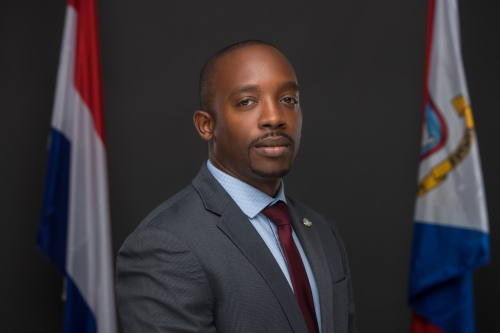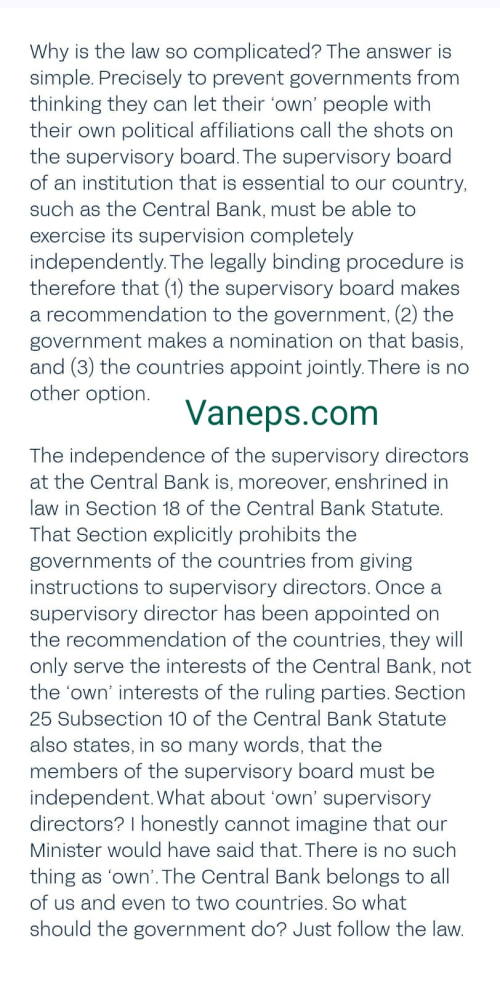 PHILIPSBURG:--- Member of Parliament Ardwell Irion has raised serious concerns about recent actions by the Council of Ministers that appear to undermine the legal framework governing the appointment of the Chairperson of the Supervisory Board of the Central Bank of Curaçao and Sint Maarten (CBCS).
PHILIPSBURG:--- Member of Parliament Ardwell Irion has raised serious concerns about recent actions by the Council of Ministers that appear to undermine the legal framework governing the appointment of the Chairperson of the Supervisory Board of the Central Bank of Curaçao and Sint Maarten (CBCS).
According to MP Irion, the nomination of Mr. Jairo Bloem is unlawful. It sets a dangerous precedent if allowed to proceed without adhering to the legal requirements of the Central Bank Statute.
“This issue goes to the heart of institutional credibility and the rule of law. We must protect the independence of our Central Bank, not politicize it.”
The Legal Framework and the Court’s Position:
Article 25 of the Central Bank Statute governs the appointment of the Supervisory Board, including the appointment of its Chairperson. It requires that:
The Chair is appointed jointly by the governments of Sint Maarten and Curaçao via national decree (landsbesluit)
The nomination must be based on a recommendation adopted by at least five-sixths of the Supervisory Board
Ministers may not initiate or finalize appointments outside this structure
In 2021, the Joint Court of Justice reinforced these rules. In its 23 August 2021 decision, the Court refused to appoint a Chair, stating:
 “Ingevolge artikel 25 lid 3 van het Centrale Bank-statuut geschiedt benoeming van de voorzitter op gezamenlijke voordracht van de Ministers, gebaseerd op een aanbeveling opgemaakt door 5/6 meerderheid van de RvC. Nu de RvC na de tijdelijke benoemingen weer grotendeels bemand zal zijn, ziet de President in dit stadium geen aanleiding om over te gaan tot tijdelijke benoeming van een voorzitter.”
“Ingevolge artikel 25 lid 3 van het Centrale Bank-statuut geschiedt benoeming van de voorzitter op gezamenlijke voordracht van de Ministers, gebaseerd op een aanbeveling opgemaakt door 5/6 meerderheid van de RvC. Nu de RvC na de tijdelijke benoemingen weer grotendeels bemand zal zijn, ziet de President in dit stadium geen aanleiding om over te gaan tot tijdelijke benoeming van een voorzitter.”
A follow-up ruling on 29 November 2021 clarified that temporary board appointments remain valid only until the governments complete proper appointments via national decree, as required by Article 25(4).
These rulings are unequivocal: without a five-sixths recommendation and landsbesluit, no Chair can be appointed, not by the Ministers, not by the Court.
What Caused the Delays: Legal Uncertainty and Government Inaction
Much has been said about delays in CBCS board appointments, but the facts matter.
When temporary members were nominated in 2021, the local security service (VDSM) refused to conduct the required screenings, claiming no legal basis. Historically, such screenings were standard before any national decree was signed. The resulting legal vacuum created a months-long impasse.
During my tenure as Minister of Finance, legislation was amended to address this issue and legally require the screening of CBCS board members. Only then could lawful appointments resume.
In that period, a name was submitted to me via a five-sixths recommendation from the Supervisory Board. I was later informed that a second candidate was being considered. All nominations came from the Board as required by law. No Minister had the authority to generate or substitute candidates independently.
Unfortunately, the current administration has yet to finalize the national decrees of those temporary appointments. This failure has stalled the process of lawfully appointing a Chair and allowed the situation to be misrepresented as deadlocked, when in fact, it was deliberately left unresolved.
Questions the Government Must Answer
If the government claims its recent nomination is legal, it must explain:
1. What process was followed to arrive at the nominee?
2. Who were the other potential candidates, if any?
3. Were those candidates formally submitted by the Supervisory Board?
4. Which firm or government entity was used to identify or evaluate candidates?
5. Did the Department of Legal Affairs provide a formal legal review, as is standard in Central Bank matters?
6. Who advised the Council of Ministers on the legal soundness of the process?
7. Did the Council of Ministers of Curaçao approve the nomination and issue its own supporting advice?
Additionally, in the interest of transparency and public trust:
8. Who were the members of the CBCS Supervisory Board during the period leading up to and during the ENNIA crisis?
9. What decisions or oversights during that period contributed to the situation now affecting thousands of policyholders?
10. Are any of those individuals currently involved in the nomination or recommendation process?
Public confidence in the Central Bank depends on a transparent and legally sound appointment process, not political maneuvering or selective disclosure.
The Joint Court of Justice has already affirmed that appointments to the CBCS Supervisory Board, especially that of Chair, must follow the strict procedures of Article 25 of the Statute. No exceptions exist.
As Members of Parliament, we should not support any attempt to legitimize an appointment that bypasses the Supervisory Board, lacks the required two-thirds recommendation, or is not formalized through a joint national decree.
This is not about one individual. This is about the integrity of our institutions and the rule of law.
Click here to read law on Central Bank Procedures












